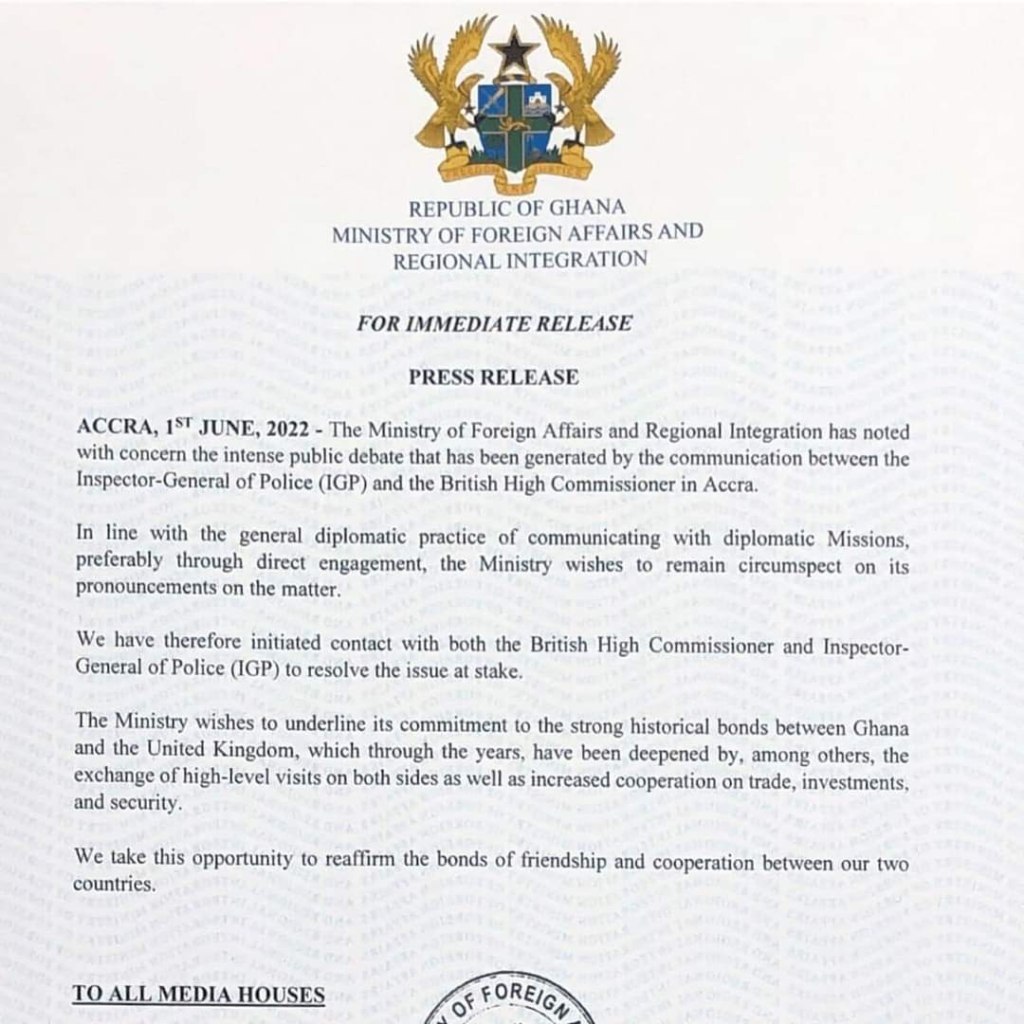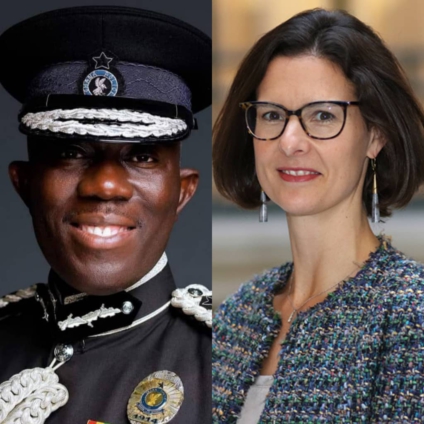On Tuesday, May 31, I stepped out briefly to emcee an event. The Ghana Photojournalists Network held an inauguration ceremony, and I had the honour of moderating the proceedings.
During the event, I browsed my phone intermittently; keeping an eye on what was happening beyond the four walls of the Accra International Press Centre, where the ceremony was held.
Then suddenly, I saw a notification on my phone. It was a tweet with ‘Dampare’ in it. Honestly, there was no motivation to unlock my phone and see the full content of the tweet.
I assumed that if it is Dampare, then perhaps Ghanaians were heaping their usual praises on him. After all, that has been the story about him since he assumed office as Ghana's Inspector General of Police on 21st July, 2021; taking over from his predecessor, James Oppong-Boanuh.
But when I finally unlocked my phone, my assumptions were wrong. Contrary to what I had imagined, Dr. George Akuffo-Dampare, the man who had endeared himself to Ghanaians as a fine and responsible public servant, was being shredded by some angry netizens for the first time.
This whipped up my curiosity to know what exactly was happening. Soon, the programme I was emceeing came to an end, and upon reading the full details of why Dampare was being lambasted on social media, I was compelled to agree with his critics.
In the ensuing paragraphs, I shall explain the basis of my disappointment in Dampare, and why I think his letter to the British High Commissioner was distasteful and a sign of bad leadership.
But before I do that, let me offer you a little bit of context. The IGP in a four paged letter expressed his reservations with the British High Commissioner, after she had tweeted on the arrest of the FixTheCountry Convener, Oliver Barker Vormawor.
The tweet was on May 17, 2022; where she wrote as follows: “Oliver Barker Vormawor, convener of #FixTheCountry movement, arrested again, I understand for a motoring offence on his way to court. I’ll be interested to see where this goes...”
According to the IGP, this was a violation of the 1961 Vienna Convention on Diplomatic Relations. As a result, he admonished the British High Commissioner, Harriet Thompson, ‘to learn to keep within the limits of what concerns her’. In the local Twi dialect, this advice is rendered as ‘Di wo fie asem’.
Now listen to why I find that particular comment and the entirety of the IGP’s letter as unfortunate.
Public service is a den of honey, but at the same time a pit of thorns. While it comes with sumptuous privileges, it is also accompanied by a basket of many unpleasantries. One of such unpleasantries is public backlash from idiots and remarks from rational thinkers alike.
However, a public officer, like the stature of the Inspector General of Police is expected to embrace all comments and sift the wheat from the chaff. In other words, he must look beyond the letter of what is said to him, and delve into the substance of it. That in my opinion is what a good leader should do.
Accordingly, when the British High Commissioner tweeted, regardless of the tone and the content, Dampare should have looked beyond what she wrote and taken the effort to understand the hidden message in her tweet.
The hidden message for me was the fact the Police should be careful in the way it handles persons who are perceived to be criticising the government.
But even if that was not the intent of the Commissioner, should the IGP have asked the High Commissioner to mind her own business? Is it a good thing for public officers to tell their critics to mind their own business? Is that democracy enough?
Secondly, the IGP’s letter to Harriet Thompson is unfortunate because it will significantly affect the goodwill Dampare has among Ghanaians. From the day he took office till date, he has been the toast of many citizens. His affable demeanour and proactiveness have made him the ‘darling’ of many.
This is seen in the praises Ghanaians heap on him and the commendations he receives on both traditional and social media.
However, as far as I am concerned, this aura of mass goodwill will no longer be the same. The evidence of the incoming disaffection for the IGP is in the way some Ghanaians took him to the cleaners over his four-paged letter.
Bear in mind that prior to now, the IGP has never come under such public backlash. However, for the first time, he was subjected to unmeasured insults. In my opinion, this is beginning of the disrespect that he will start receiving; unlike before when everyone saw him as the angelic game changer.
The big question is that, what opened these flood gates? His own letter and the tone he chose as well. A good name they say is better than riches, and I would have expected the IGP to be mindful of this and be guided accordingly.
Unfortunately, he chose to resort to jabs and confrontational language, and I dare say that will affect his goodwill henceforth. People will start treating him like the way they engage the regular politician, and that will affect his goodwill. Is he sure he wants to lose the all the respect and goodwill he has amassed?
Lastly, the IGP's response to the British High Commissioner was ill-advised because, it has the tendency of foiling the longstanding rapport between Ghana and UK, and by extension the Ghana Police Service.
This is possible because of the language and approach the IGP employed. A short tweet should not have warranted a long letter like what the IGP wrote. That is similar to killing an ant with a sledge hammer.
Dampare had the option of resorting to a softer and more diplomatic approach in expressing his concerns. Imagine what would have happened if the IGP had privately visited the British High Commissioner, and later shared photos on social media with the two of them holding hands?
Wouldn't that have been better? ...
I am however happy about the fact that the Ministry of Foreign Affairs and Regional Integration has taken steps to reconcile the two parties. With the British High Commissioner having explained on Accra based GHOne TV that she meant no harm, I hope the tensions will come to an end.

Latest Stories
-
OSP appeals acquittal of Juaben MCE nominee in alleged bribe case
12 minutes -
Empowering Africa’s Digital Future: How Artificial Intelligence is driving sustainable network infrastructure
38 minutes -
Republic Bank Ghana PLC records GH₵210.67m revenue in 2024
49 minutes -
Influence of market queens creating food shortages and causing high food prices – Dr. Ofosu-Dorte
52 minutes -
Surging travel in Europe spikes concerns over tourism’s drawbacks
53 minutes -
Federal Government hands over houses to 1994 Super Eagles heroes after 31 years
54 minutes -
Air India crash attributed to pilot seat malfunction
1 hour -
GCAA and South Korea sign letter of intent to advance Ghana’s drone sector
1 hour -
Republic Bank Ghana promises improved lending to customers, prospective home owners
1 hour -
Ghana ranks among top 6 African economies in Intra-African trade – Afreximbank Report
1 hour -
Allied Health Professions Council warns against unlicensed practice
1 hour -
Energy Minister engages petroleum sector stakeholders on laycan concerns
2 hours -
‘We played a great second half’ – Black Queens coach on friendly against Benin
2 hours -
Yara Ghana deepens commitment to women in agribusiness
2 hours -
Afreximbank has been a pillar in Ghana’s economic journey – Deputy Finance Minister
2 hours

